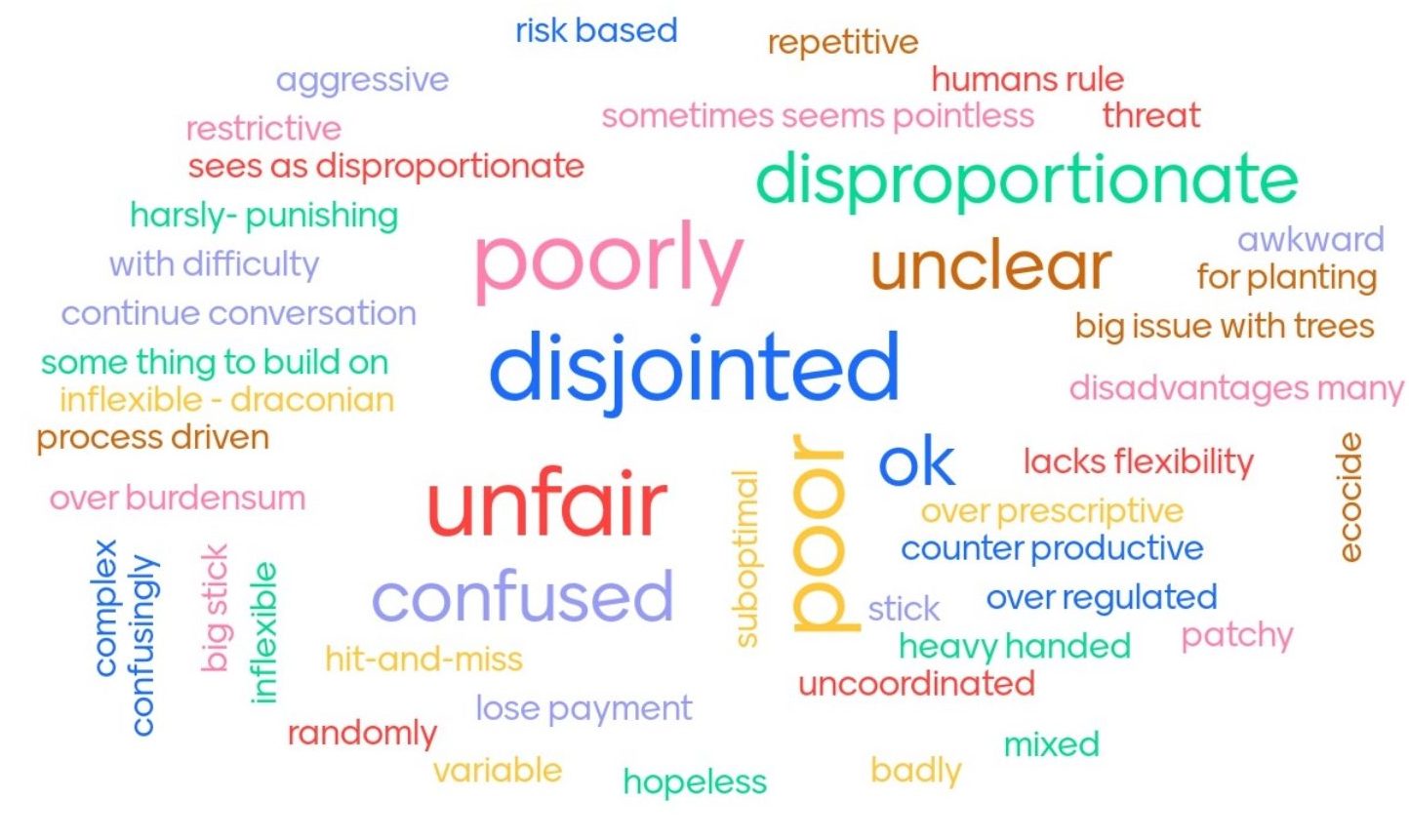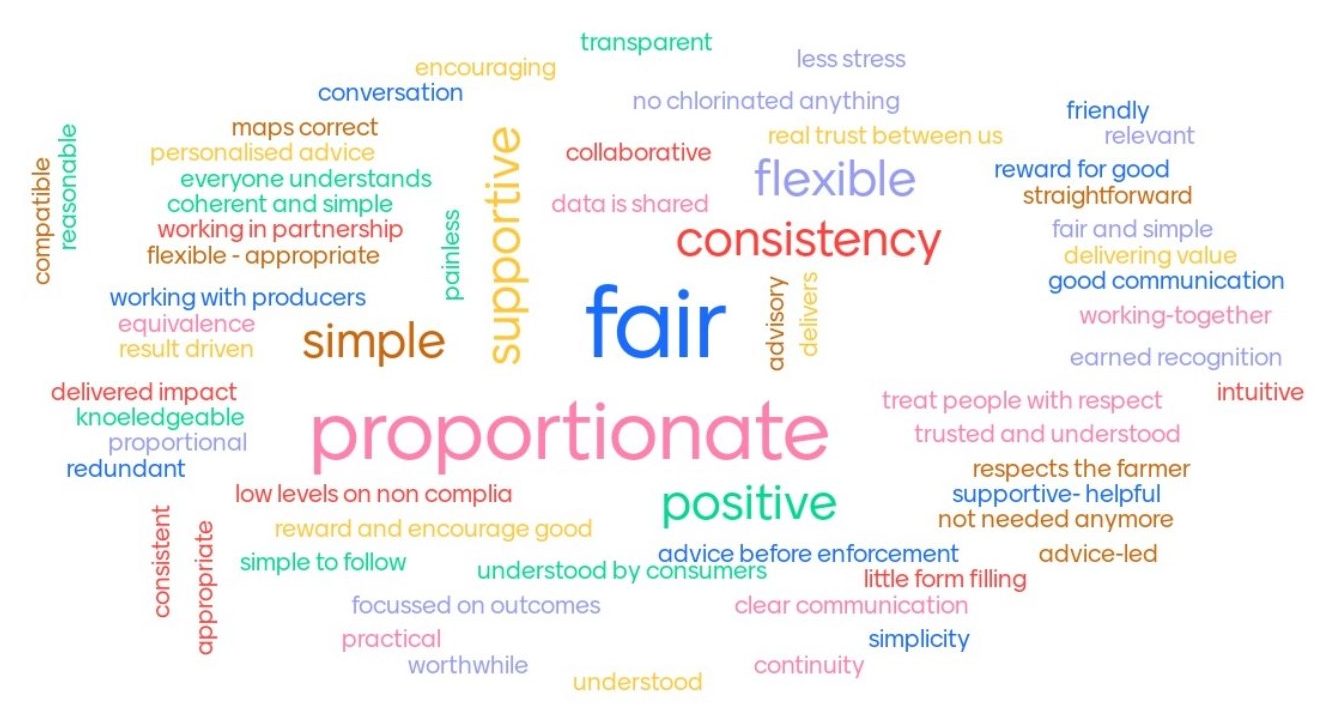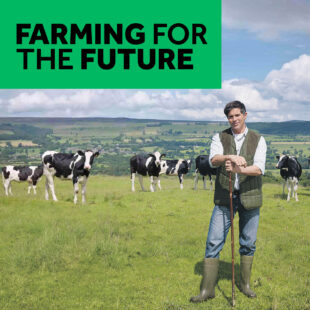This post is about a series of co-design workshops we ran at the end of last year on farming regulation: how it works now and how we might improve it.
One of our goals is to improve the way we set and enforce the rules for agriculture, animal welfare and the environment. We want to make the rules, and the way we enforce them, clearer, fairer and more effective.
To do this, we need to work in partnership with farmers, land managers and experts. This will help us to understand the issues and their root causes and generate workable ideas to make things better.
Farmers and land managers encounter regulations every day. Their lives and work are most immediately affected by them.
But there are lots of other people who care about the issues and have valuable expertise and ideas to offer.
So we invited a wide selection of people to join us in the first in a series of interactive workshops to look at the issues. They included farmers, farming advisers, assurance scheme providers, charities, environmentalists and inspectors.
Looking at the past and present
We asked participants to share their experiences of farming regulation. What we got was an open, honest assessment of the current system grounded in the realities of farming.
We used digital tools to help people quickly and easily share their thoughts and ideas with each other. This also made it easier to assess the level of consensus and draw out common themes and things to discuss.
At the beginning of each session we took a snapshot of how our participants felt regulation works now, using a tool called Mentimeter. It can create word clouds that sum up feelings and opinions from many people in a single image.
Below is one snapshot of what people said about how agricultural regulation works now.
 Participants across the workshops largely shared the view that our current regulatory system has plenty of room for improvement: it’s too complex, disproportionate and often unfair.
Participants across the workshops largely shared the view that our current regulatory system has plenty of room for improvement: it’s too complex, disproportionate and often unfair.
One participant said:
Compliance can be costly - some activities are complex and need external input. Farmers want inspections to reflect local reality (weather, topography etc) – ideally [in a] relationship with local adviser or inspector.
During the workshops, people told us that the current regulatory approach is viewed as:
- disconnected from the realities of farming, that a “one size fits all” approach does not account for differences, between farms or between regions, for example.
- too complex. Few farmers have time to read and fully understand rules and regulations
- inconsistent both in terms of the guidance provided and the application of the standards, with serious breaches going unenforced and minor paperwork breaches resulting in disproportionate fines
They also told us:
- the experience could be improved with a few administrative changes
- there isn’t enough support for people who must implement the rules
One participant said:
Administration time has increased massively over the last 40 years. Need to keep too many different record books: herd book, flock book, health records, cattle movements, BPS etc. If this could be centralised it would be easier.
These themes align closely with what the sector told us in response to the 2018 Health and Harmony consultation and in Dame Glenys Stacey’s Farm Inspection and Regulation Review.
We now have a good sense of the problems affecting the sector – and new insight into how regulation affects farmers in their daily lives.
We’ve taken some of the feedback from those consultations and these workshops and applied it to the improvements we’ve made to cross compliance rules and inspection arrangements for 2021.
We’ve made cross compliance rules more straightforward and the inspection and enforcement process fairer and more proportionate. For example, for minor breaches, we’ll be making more use of warning letters rather than defaulting immediately to fines.
To make the rules clearer and simpler, we’re working to improve and clarify our guidance on GOV.UK. We’re always looking for people to help us test and improve our guidance, so if you’d be willing to help us make our guidance better then please get in touch by commenting below.
To make regulation and enforcement more joined up, we’ve also been looking into the role that assurance schemes can play in future regulation, so that if you’re part of an assurance scheme we can officially recognise that within the government regulatory regime. We’ll share more of our thinking about this later this year.
Looking to the future
At the end of the session we asked people to describe what good farming regulation would look like to them, in the future.

There was consensus across all 3 workshops for our new regulatory approach to be "fair", "supportive", "proportionate" and "simple". We think these are good guiding principles for us to work to as we think about what regulation and enforcement should look like in the future.
This is just the start
About 120 people joined us for these first few sessions and we had good representation of our users including farmers, land managers, inspectors and officers from Local Authority teams amongst others.
Together we reached a shared understanding of the problems we seek to solve, informed by people’s real experiences of regulation. Participants gave us ideas on how we can work together with the sector to create solutions that work.
One unexpected consequence of COVID-19 is that we improved our remote working.
Through necessity we have expanded our use of collaborative digital tools. This has allowed us to involve a greater number of participants from across the entire country, in the same ‘digital room’, in a way we never would have been able to do in in-person events.
Involving a wide range of people, particularly those who might not have previously been able to, makes for good co-design.
These sessions were also a great opportunity to get a sense of how we should structure and run more detailed, more specific and more practical sessions in future.
The pictures above are just a snapshot. We're still analysing what we learned. For example, we asked our participants to tell stories about their experiences, so that we could understand the issues in more depth and in the context of people’s lives. This gave us a huge range of rich insights into how things work and how they can be improved.
We’re excited to see where co-design can take us and we'll share more details of upcoming sessions here when we can. We’re going to publish more blog posts about other workshops that have helped us explore and understand the challenges and opportunities for developing the New Entrants scheme and Slurry Improvement scheme.


1 comment
Comment by Richard Head posted on
Our natural environment is being destroyed exponentially by modern methods of production. The one environmentally beneficial form of farming is “organic” where the use of chemicals is eschewed. The organic bodies administer their own regulations and diligently regulate their members. The outcome of organic farming is by definition bound to be beneficial to the environment. It is an “oven-ready” autonomous system which requires minimal regulation from government. Farmers should be given a greater incentive to adopt it.
However the prescriptions and regulations of the organic bodies are stringent. They tend to impede adoption. It should not be difficult to conceive of a less prescriptive system with the same objectives, which would have greater appeal.